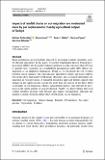Impacts of rainfall shocks on out-migration are moderated more by per capita income than by agricultural output in Türkiye
Author(s)
Delacrétaz, Nathan; Lanz, Bruno; Delju, Amir H.; Piguet, Etienne; Rebetez, Martine
Download11111_2023_Article_423.pdf (1.805Mb)
Publisher with Creative Commons License
Publisher with Creative Commons License
Creative Commons Attribution
Terms of use
Metadata
Show full item recordAbstract
Abstract
Rural populations are particularly exposed to increasing weather variability, notably through agriculture. In this paper, we exploit longitudinal data for Turkish provinces from 2008 to 2018 together with precipitation records over more than 30 years to quantify how variability in a standardized precipitation index (SPI) affects out-migration as an adaptation mechanism. Doing so, we document the role of three potential causal channels: per capita income, agricultural output, and local conflicts. Our results show that negative SPI shocks (droughts) are associated with higher out-migration in rural provinces. A mediated-moderator approach further suggests that changes in per capita income account for more than one quarter of the direct effect of droughts on out-migration, whereas agricultural output is only relevant for provinces in the upper quartile of crop production. Finally, we find evidence that local conflict fatalities increase with drought and trigger out-migration, although this channel is distinct from the direct effect of SPI shocks on out-migration.
Date issued
2023-06-20Department
Massachusetts Institute of Technology. Joint Program on the Science & Policy of Global ChangePublisher
Springer Netherlands
Citation
Population and Environment. 2023 Jun 20;45(3):12
Version: Final published version